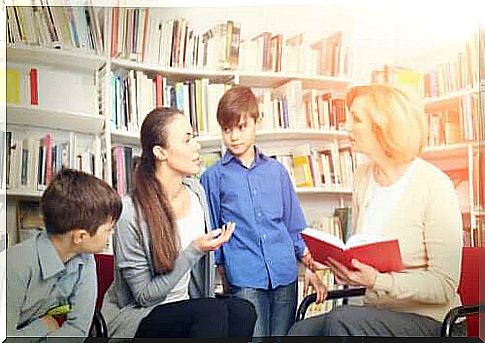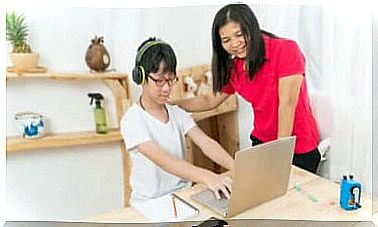How To Build A Collaboration Between Family And School

Imagine you have to stop a football and you are all alone. Now think of the ball turning into ten balls at once. Can you handle it without help? Probably not. This example helps to illustrate the importance of having a support group where everyone helps each other. That said, we’ll talk about how to build a family-school partnership.
We often say that a child’s mind is like an empty book. It is their experiences that will write the story of their lives. And these experiences will be based on their experiences with their family, and also with friends, at school, etc.
That is why it is so important that we all work in the same direction. That way, the empty book that is a child’s mind is not filled with contradictions, confusion, and insignificant experiences.

A collaboration between family and school
Family and school are the two major elements that will educate and shape the individual in a good portion of their lives. Therefore, they must be complementary and cooperative and never competitors.
For this reason, and given that the school environment and the family environment are different, and each has its own peculiarities, we will provide a series of tips so that each party seeks the involvement of the other.
Tips for parents to improve their engagement
What can the school do through its teachers, professionals and educators to achieve greater parental involvement in their children’s education? Let’s look at some interesting keys:
- Active listening to parents’ concerns: Parents know their children well, their special circumstances, hobbies, habits, routines, customs, etc. As teachers, it is important to listen to them and support them.
- Interest: If there are behavioral changes in a child, a decrease in their school performance, or changes in attitudes between family and school contexts, communication is fundamental and must be fluid.
- Personal meetings: The meetings between parents and teachers should be personal. This is because each child is unique and has their own concerns, difficulties and strengths.
- Clear explanations: As teachers, schools will offer parents relevant explanations in a clear way. And they will take the time they need to do so and review all the necessary points, including points for improvement.
- Parent meetings: It is also good to maintain fluent communication to reinforce the behaviors that go well in school and that deserve to be maintained in the family environment.
Tips for involving teachers
Let us now look at how we form a collaboration between family and school from the parents’ perspective. In other words, it is to involve teachers in the daily work with children so that they become an active part of their education beyond just the class. In this sense, the following points are important:
- Appreciate the work of the professional: As parents, in addition to appreciating the teacher, we must trust their criteria and listen respectfully to their decisions and contributions.
- Frequent communication: It is important to maintain frequent and fluent communication and meet at least once every school year to discuss possible issues that may arise with their children’s progress and identify possible issues that may arise academically, socially or behaviorally.

- Requests for help: As parents, we will ask teachers for help when we have educational problems with our children. They help us resolve any doubts that may arise.
- Avoid undermining the teacher’s authority : It is important not to question the teacher’s authority, not at all in front of your children. Children need to understand that the teacher is their point of reference and they need to treat them with respect and consideration.
- Talking to the children: It is also important to talk to the children at home about their life at school. This way, parents will be able to stay up to date.
- Reinforcement: It is also good to reinforce the learning that children receive in school, at home. This creates interest in culture, reading, art or science and creates a good atmosphere.
- Participation in activities: Lastly, it is important that the parents work together and actively participate in the activities that the school performs. In this way, the parents support and appreciate the teacher’s work.
You already have some interesting ideas on how to form a collaboration between family and school from the point of view of parents and the educational institution. Together you can create an insoluble association that will help the children a lot.









